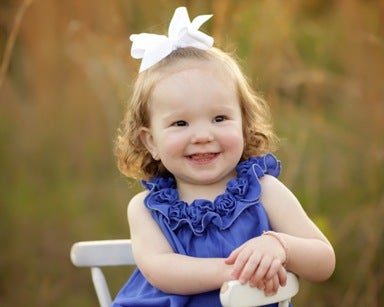Tracheal Rings
A birthday should be a happy occasion for every child and Stella Hardy and her family from Holt, Fla., had much to celebrate when she recently turned 2. In just a year, Stella, a patient in Aerodigestive Program at Children’s of Alabama, has gone from a seriously ill baby to happy and healthy toddler. Soon after Stella was born, her parents noticed that she sounded congested whenever she took a bottle. “She sounded very ‘junky,’ like she needed to clear her throat. We eventually made an appointment with her regular pediatrician and they diagnosed her with reflux,” said Stella’s mom, Miriam Hardy. At 4 months, Stella caught her first cold and was hospitalized with what her doctors thought was croup. Although she had breathing treatments and antibiotics, her breathing remained shallow and noisy. “We started seeing an ENT in our local Florida area who diagnosed her with tracheomalacia, or a floppy airway. We were told that she would grow out of it, but in the meantime, colds would be tough,” Hardy said. Two weeks later, Stella was back in the hospital, this time in the pediatric intensive care unit where doctors placed her in medically-induced coma to try to alleviate some of her breathing difficulties. “From that point on we continued seeing our local ENT and isolated ourselves from any outside contact. We removed our older son from preschool, stopped taking Stella out in public and stopped attending church. Basically we lived in a bubble,” Hardy said. “She was also having some growth concerns and not gaining much weight. By this time she should have been eating a lot of solids and she was primarily on formula,” Hardy noted. After six months of virtual isolation, Stella caught another cold and was hospitalized once again. Her parents sought a second opinion from another ENT at a different hospital and received yet another diagnosis. “At this point, we were ready for answers. A friend’s daughter had tracheal surgery performed by Dr. Wiatrak at Children’s and they told us about the Aerodigestive Program. We contacted Children’s and were able to get right in,” Hardy said. The Aerodigestive Program at Children’s, one of only a handful in the nation, brings together the expertise of pediatric physicians and healthcare personnel specializing in ENT, Pulmonary, GI and Feeding, Surgery and other areas to evaluate and manage the care of children with airway, respiratory, gastrointestinal, swallowing and feeding concerns. Team members include: Dr. Tom Harris, a pediatric pulmonologist; Dr. Brian Wiatrak, director of pediatric otolaryngology (ENT); Dr. Nicholas Smith and Dr. Brian Kulbersh, pediatric ENTs; Dr. Reed Dimmitt, director of pediatric gastroenterology; speech-language pathologist Beth Crawford and Ashley, Chapman, RN, the coordinator for the team. In addition, Children’s has now opened one of the nation’s few intensive feeding programs, developed and directed by clinical psychologist Dr. Michelle Mastin. To date, the program has served over 200 patients, referred from both Alabama and surrounding states. The key to the program’s success is a collaborative environment that results in better communication among physicians and with families and more coordinated care for patients. “Communication has been a long-time complaint for families. Caregivers often report frustration about who is talking to whom and the medical condition might not have been alleviated. Physicians were also often frustrated by barriers to communication and care coordination ,” said Dr. Harris, the program’s medical director. The team meets together regularly to evaluate and discuss patients’ medical needs. If a diagnostic procedure, such as endoscopy, is required, team members view the results together and discuss treatment options. “It’s a great forum to discuss management and frankly, learn from one another,” Harris said. Knowing that their daughter was receiving coordinated care was very reassuring for Stella’s parents. “We saw the same types of doctors in Florida. We had a pulmonologist, an ENT and a GI doctor. They were all in the same building, but they never communicated or worked together. At Children’s, the doctors sit down and discuss. They go into surgery together so the child only has to be put to sleep once. They are all on the same page and communicate together and with the parents. We just love them,” Hardy said. The Aerodigestive team determined the underlying cause of Stella’s medical issues was complete tracheal rings, a rare birth defect in which rings of cartilage surround the trachea. “She had multiple rings that prevented the trachea from growing. She was growing, but her trachea was staying the same size,” Hardy said. Stella returns to Birmingham every six months for a checkup. “She’s doing very well. She started daycare in April once the cold and flu season was past and that was something she had never been able to do,” Hardy said. “We are very grateful for the doctors, nurses and staff at Children’s. It took us 13 months and many hospital stays to have our daughter properly diagnosed. Since her surgery, we have not been in the hospital and only seen doctors for normal, routine care. We can’t say enough great things about the Aerodigestive team. We had started feeling like we didn’t have anyone in the medical community on our side with Stella, but Children’s quickly changed that. We no longer felt our daughter wasn’t a top priority and there were bigger cases. Everyone at Children’s makes you and your child feel important,” Hardy said.







